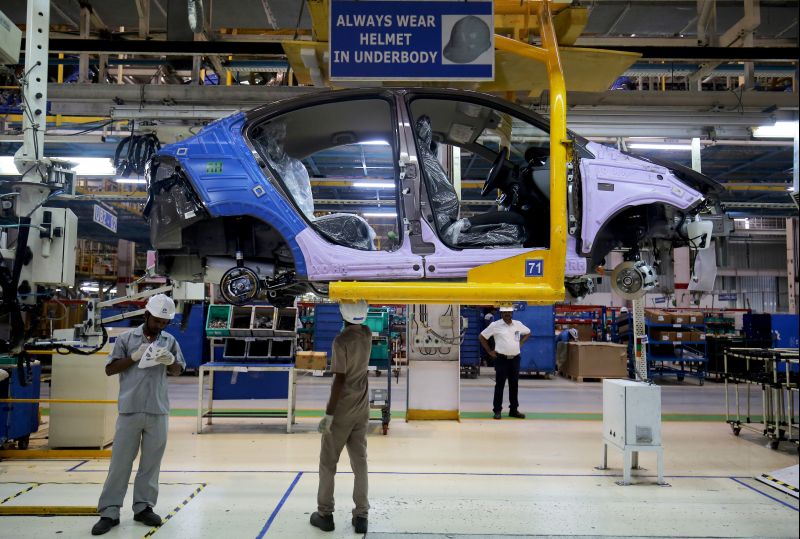Slowdown continues: Domestic passenger cars sales plunge 36%

Workers assemble a Tata Tigor car inside the Tata Motors car plant in Sanand, on the outskirts of Ahmedabad on August 7, 2018. (REUTERS File Photo)
New Delhi, August 13 (IANS): The slump in domestic passenger cars' sales continued with the segment's off-take plunging by 35.95 per cent in July.
Industry observers cited high cost due to GST and lack of adequate liquidity as the main reasons for the sales slowdown.
According to the Society of Indian Automobile Manufacturers (SIAM), passenger cars sales in the domestic market dropped to 122,956 units from 191,979 units sold during July 2018.
Among the other sub-segments of passenger vehicles, the number of utility vehicles sold in India went down by 15.22 per cent to 67,030 units in July 2019, while 10,804 vans were sold last month, down 45.68 per cent from the corresponding month of 2018.
Overall, passenger vehicle sales declined 30.98 per cent in July to 200,790 units from 290,931 units.
In the commercial vehicle segment, domestic sales were down by 25.71 per cent to 56,866 units last month, SIAM said.
Similarly, the data pointed out that three-wheelers' sales decelerated. The segment's off-take went down by 7.66 per cent to 55,719 units during the month in consideration.
In addition, overall sales of two-wheelers, which include scooters, motorcycles and mopeds, edged lower by 16.82 per cent to 1,511,692 units.
Accordingly, the total sales of the Indian automobile sector declined by 18.71 per cent during July 2019 to 1,825,148 units across segments and categories.
However, exports across categories were higher by 4.22 per cent to 414,596 units.
Auto sector workers' seek govt intervention
Faced with the nightmarish prospect of job losses, auto sector employees have sought government's intervention through relief measures for the industry dented by truncating demand.
The employees cited that till now job losses have mainly occurred on the part manufacturers' side, however, if the current market conditions prevail then downsizing might become a reality even in the OEMs.
At present, the automobile industry has been impacted the hardest by a consumption slowdown which is a culmination of several factors like high GST rates, farm distress, stagnant wages and liquidity constraints.
Besides, inventory pile-up at the dealership level and stock management of unsold BS-IV vehicles have become a problem for the sector.
Accordingly, the industry's production levels have also receded as demand plunged, eventually leading to job losses.
Industry insiders at the auto cluster of Gurugram-Manesar, home to automobile majors such as Maruti Suzuki, Hero MotoCorp and Honda Motocycle & Scooter India, say that around 50,000 to 1 lakh temporary employees across the entire value-chain, including those from ancillary industries, logistics and raw material suppliers, have been sent on unpaid leave or sacked.
However, no authentic data is currently available on the extent of job losses, as most of these have occurred on the auto part suppliers' side.
"The industry is struggling to survive. It requires oxygen in the form of relief measures like lower GST taxes and better road networks," Kuldeep Janghu, General Secretary of Maruti Udyog Kamgar Union, told IANS in Gurugram.
"The auto industry is completely run by private sector and these companies will not be able to sustain or require the current levels of manpower, as production will fall on the back of declining demand."
According to Satish Kumar, an employee with a tier-I parts manufacturer to an automobile major, stable policies are required, as the ever changing physical specification of parts due to newer norms has led some vendors to shut-shop.
"These changes based on newer norms have been taken from developed countries and require heavy investments even on the side of small parts manufacturers. Many vendors had to simply shut shop because they did not have access to those kind of resources," Kumar said.
"It seems that customers have also postponed purchases and are waiting for the change in technology from BS IV to BS VI."
In addition, the employees have asked the government to create an environment for easier access to finance that might prop-up sales.
"The collapse of NBFCs is a major factor for the sales downturn as these companies used to provide bulk of automobile financing," Rajesh Shukla, General Secretary of Hero MotoCorp Workers Union, told IANS.
"The government should look into the issue and create an environment where access to cheap finance is available."
Last week, automobile sector's representatives met Finance Minister Nirmala Sitharaman to apprise her of the grim situation.
Recently, all major OEMs consisting of passenger, commercial, two and three wheeler manufacturers have reported a massive decline in domestic sales.
Figures from the Society of Indian Automobile Manufacturers (SIAM) showed that domestic passenger car sales in June went down by 24.07 per cent to 139,628 units. The July figures are awaited.
Consequently, sales slowdown led to curtailment of manufacturing with the domestic passenger cars' production coming down by 22.26 per cent to 169,594 units in June.






